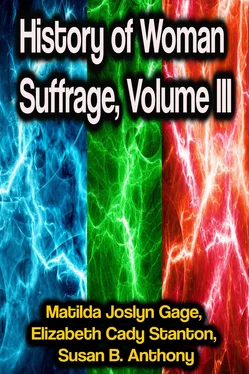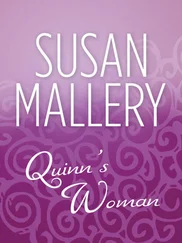As if left ignobly to illustrate the truths of their noble declarations, no sooner did the enfranchised class enter upon the exercise of their usurped powers than they proceeded to alienate from the mothers of humanity rights declared to be inseparable from humanity itself! Had they thrust the British yoke from the necks of their wives and daughters as indignantly as they thrust it from their own, the legal subjection of the women of to-day would not stand out as it now does—the reproach of our republican government. As if sons did not follow the condition of the mothers—as if daughters had no claim to the birthright of the fathers—they established for disfranchised woman a "dead line," by retaining the English common law of marriage, which, unlike that of less liberal European governments, converts the marriage altar into an executioner's block and recognizes woman as a wife only when so denuded of personal rights that in legal phrase she is said to be—"dead in law"!
More considerate in the matter of forms than the highwayman who kills that he may rob the unresisting dead, our gallant fathers executed women who must need cross the line of human happiness—legally; and administered their estate; and decreed the disposition of their defunct personalities in legislative halls; only omitting to provide for the matrimonial crypt the fitting epitaph: "Here lies the relict of American freedom—taxed to pauperism, loved to death!"
With all the modification of the last quarter, of a century, our English law of marriage still invests the husband with a sovereignty almost despotic over his wife. It secures to him her personal service and savings, and the control and custody of her person as against herself. Having thus reduced the wife to a dead pauper owing service to her husband, our shrewd forefathers, to secure the bond, confiscated her natural obligations as a child and a mother. Whether married or single, only inability excuses a son from the legal support of indigent and infirm parents. The married daughter, in the discharge of her wifely duties, may tenderly care and toil for her husband's infirm parents, or his children and grandchildren by a prior marriage, while her own parents, or children by a prior marriage—legally divested of any claim on her or the husband who absorbs her personal services and earnings—are sent to the poor-house, or pine in bitter privation; except with consent of her husband, she can give neither her personal care nor the avails of her industry, for their benefit. So, to be a wife, woman ceases, in law, to be anything else—yields up the ghost of a legal existence! That she escapes the extreme penalty of her legal bonds in any case is due to the fact that the majority of men, married or single, are notably better than their laws.
Our fathers taught the quality and initiated the form of free government. But it was left to their posterity to learn from the discipline of experience, that truths, old as the eternities, are forever revealing new phases to render possible more perfect interpretations; and to accumulate unanswerable reasons for their extended application. That the sorest trials and most appreciable failures of the government our fathers bequeathed, to us, have been the direct and inevitable results of their departures from the principles they enunciated, is so patent to all Christendom, that free government itself has won from our mistakes material to revolutionize the world—lessons that compel depotisms to change their base and constitutional monarchies to make broader the phylacteries of popular rights.
Is it not meet then, that on this one-hundredth anniversary of American independence the daughters of revolutionary sires should appeal to the sons to fulfill what the fathers promised but failed to perform—should appeal to them as the constituted executors of the father's will, to give full practical effect to the self-evident truths, that "taxation without representation is tyranny"—that "governments derive their just powers from the consent of the governed"? With an evident common interest in all the affairs of which government properly or improperly takes cognizance, we claim enfranchisement on the broad ground of human right, having proved the justice of our claim by the injustice which has resulted to us and ours through our disfranchisement.
We ask enfranchisement in the abiding faith that with our coöperative efforts free government would attain to higher averages of intelligence and virtue; with an innate conviction, that the sequestration of rights in the homes of the republic makes them baneful nurseries of the monopolies, rings, and fraudulent practices that are threatening the national integrity; and that so long as the fathers sequester the rights of the mothers and train their sons to exercise, and the daughters to submit to the exactions of usurped powers, our government offices will be dens of thieves and the national honor trail in the dust; and honest men come out from the fiery ordeals of faithful service, denuded of the confidence and respect justly their due. Give us liberty! We are mothers, wives, and daughters of freemen.
C. I. H. Nichols.
London, Eng., July 4, 1876.
My Dear Susan: I sincerely thank you for your kind letter. Many times I have thought of writing to you, but I knew your time was too much taken up with the good cause to have any to spare for private correspondence. Occasionally I am pleased to see a good account of you and your doings in the Boston Investigator . Oh, how I wish I could be with you on this more than ordinarily interesting and important occasion; or that I could at least send my sentiments and views on human rights, which I have advocated for over forty years, to the convention.
This being the centenary day of the proclamation of American independence, I must write a few lines, if but to let the friends know that though absent in body I am with you in the cause for which, in common with you, I have labored so long, and I hope not labored in vain.
The glorious day upon which human equality was first proclaimed ought to be commemorated, not only every hundred years, or every year, but it ought to be constantly held before the public mind until its grand principles are carried into practice. The declaration that "All men [which means all human beings irrespective of sex] have an equal right to life, liberty, and the pursuit of happiness," is enough for woman as for man. We need no other; but we must reassert in 1876 what 1776 so gloriously proclaimed, and call upon the law-makers and the law-breakers to carry that declaration to its logical consistency by giving woman the right of representation in the government which she helps to maintain; a voice in the laws by which she is governed, and all the rights and privileges society can bestow, the same as to man, or disprove its validity. We need no other declaration. All we ask is to have the laws based on the same foundation upon which that declaration rests, viz.: upon equal justice, and not upon sex. Whenever the rights of man are claimed, moral consistency points to the equal rights of woman.
I hope these few lines will fill a little space in the convention at Philadelphia, where my voice has so often been raised in behalf of the principles of humanity. I am glad to see my name among the vice-presidents of the National Association. Keep a warm place for me with the American people. I hope some day to be there yet. Give my love to Mrs. Mott and Sarah Pugh. With kind regards from Mr. Rose,
Ernestine L. Rose.
Yours affectionately,
A new paper, The Ballot-Box , was started in the centennial year at Toledo, Ohio, owned and published by Mrs. Sarah Langdon Williams. The following editorial on the natal day of the republic is from her pen:
The Retrospect.—Since our last issue the great centennial anniversary of American independence has come and gone; it has been greeted with rejoicing throughout the land; its events have passed into history. The day in which the great principles embodied in the Declaration of Independence were announced by the revolutionary fathers to the world has been celebrated through all this vast heritage, with pomp and popular glorification, and the nation's finest orators have signalized the event in "thoughts that breathe and words that burn." Everywhere has the country been arrayed in its holiday attire—the gay insignia which, old as the century, puts on fresh youth and brilliancy each time its colors are unfurled. The successes which the country has achieved have been portrayed with glowing eloquence, the people's sovereignty has been the theme of congratulation and the glorious principles of freedom and equal rights have been enthusiastically proclaimed. In the magnificent oration of Mr. Evarts delivered in Independence Square, the spot made sacred by the signing of the Declaration of Independence which announced that "Governments derive their just powers from the consent of the governed," these words occur:
Читать дальше












